An unfair advantage is when an individual or a business operates with a distinct selling point that competitors cannot easily replicate. This advantage provides a unique and unmatched proposition, setting them apart from others in the competitive landscape.
Elon Musk and Jeff Bezos can take an idea and scale it to a billion dollar company with extremely high odds of success. You and I will probably never even start one company that reaches that scale. Why is this? Because they have extraordinary unfair advantages that stack up against the common person (you and I).
Is Money the only unfair advantage?
Growing up, we often envied the rich. We often felt that wealth (usually generational wealth) gave people an unfair advantage; that nothing else about us gave us an upper-hand against those that were wealthy.
This is far from the truth. While wealth, and having lots of it, is definitely an unfair advantage, it is far from being the only thing that can give you an edge to drive you or your startup to incredible success.
The book “The Unfair Advantage” by Ash Ali, Hasan Kubba explores this. It provides a very useful framework to identify and develop unfair advantages. And I’m going to take you through the highlights of what the book teaches.
The MILES framework from
“The Unfair Advantage”
The MILES framework to discover your Unfair Advantage
Unfair advantages manifest in many forms. The MILES framework breaks it down as follows:
Let’s dive into how each of these create unfair advantages and how you develop and leverage them in your life and business.
💰 Money
This is an obvious one. We’ve all seen many a rich kid start a business that is super risky; fail at it, dust themselves off and start again with something else. The phrase money begets money is definitely true. Trump had it, The Zuck had it, Bill Gates had it. They wouldn’t have been able to make the kind of pivots and take the kind of risks if they didn’t have the safety net that money provided.
Money as an Unfair advantage manifests in many ways:
- Provides a long runway: more the money you have, more the runway you can create to pursue your idea, even when it doesn’t generate cashflow. For instance, Musk couldn’t have sustained Tesla’s cash burn without his winnings from PayPal.
- Creates a safety cushion: if you have F*you money, it doesn’t matter that the high risk venture you started failed, it won’t destroy you. Take for instance the many ventures Google funds (and often shuts down).
Money as your unfair advantage
Even if you weren’t fortunate enough to be born rich or didn’t have a $100 million exit, you can still create the unfair advantage that money brings – by
- minimising living expenses:
live frugally, espouse minimalism - learn marketing & sales:
this can help you stretch your runway by becoming cash positive quicker - raise funding:
learn how to raise funds; start with the 3Fs: friends, family, fools - learn to code:
if you can code, you can create – monetise this! - freelance:
there are so many platforms to sell your services; support your main-hustle with side-hustles until your startup can sustain you.
💡 Intelligence and Insight
Intelligence
While IQ is part of intelligence, this is hardly the only thing that matters. Book smart, IQ, social and emotional intelligence – all of these can set you up for success. All of these can be learned, honed and sharpened. If you have a combination of these, you’d find yourself having an unfair advantage.
Intelligence and Insight as an Unfair advantage manifests in many ways:
- IQ: this helps in specific instances – higher SAT and GMAT scores, maybe bragging rights if you get into MENSA.
- Book smarts: if you can devour information from books voraciously and turn it into useful knowledge, you’ve got a superpower.
- Street smarts: are you able to bargain and get great deals? Do you generally know how to get out of sticky situations? Do you have a good BS detector? That’s a skill that will put you on top in the ‘real world’
- Social & Emotional intelligence: if you’re able to empathise with people, understand their pain points, notice how their mood and emotion changes when specific things happen – that’s gonna help you read people like a book.
- Creative intelligence: if you are generally good at finding solutions to tough problems, where others struggle – this is a superpower few possess.
- Insight: if you have specific knowledge about something that few are aware of because of your experience, that’s insight. This can help you create Product-Market-Fit, take a startup from 0 to exponential growth. Insight can make you billions!
Intelligence and Insight as your unfair advantage
If you find yourself lacking in some of the ‘intelligences’, you can create the unfair advantages that intelligence and insight bring by
- cultivating your curiosity:
step into a mindset of growth and learning. Incorporate the student-for-life mindset. - ask more questions:
you gain insight by asking questions. Spend more time with the problem than the solution and you’re bound to gain incredibly valuable insights. - do more experiments:
try different things, create indiscriminately, treat each creation as an experiment. - notice how people feel about things:
this can help you discover where opportunities lie and what people find lacking in the world. - pay attention when people talk about pain-points and unmet needs:
same as before. You can discover untapped opportunities by paying attention to these things.
🍀 Luck and Location
Your location can be a major unfair advantage. When large trends arise, and you’re at the epicentre of where the action is – you substantially increase the odds of riding the wave.
People also say that ‘luck’ can influence success; true – but luck is something we can develop.
Luck and Location as your unfair advantage
Here is what you can do to create more luck.
- move to where the action is:
If the Mountain won’t go to Mohammed…
For your product / service / startup – find out where the customers are, the competitors are, and where the investments are flowing. Move there. - take more chances, do more things:
you miss all the shots you don’t take. There is a lot of truth in this. Do more, create more, meet more people, try new things – you will find your success increasing! - trust your intuition:
our gut feeling, especially if you have expertise and insight, can tell you where opportunities lie – trust it. - develop pragmatic optimism:
usually it’s those that believe themselves to be luck – who are lucky. Believe that you ARE lucky. Look for ways to pivot from bad luck. Look for opportunities. Make this a habit.
📚 Education and Expertise
Look at people who do MBAs. Why do they chase big brands like Harvard?
For the following reasons:
- Knowledge: the skills you built through education.
- Networking: alumni and professional networks you build by being in these programs.
- Signalling: there’s status attached to the (brand of) college you go to – companies and investors may perceive someone with an Ivy-league education as being more competent than someone else without.
There is unfair advantage even when someone hasn’t gone to a big brand college. This can manifest as
- Technical unfair advantage: if you have managed to learn, practice and become an expert in a specifically useful technical skill – that’s going to give you a substantial boost!
- Expertise: this is what you learn by doing. The work experience you gain doing things at work or on your own can provide the kind of expertise that few might possess.
Education and Expertise as your unfair advantage
- learn online:
there are numerous courses and resources to learn entire branches of skill. Use this. Develop technical skill. - read more books:
books and audio books are insanely valuable in the kind of knowledge they provide. Pick books that build on what you know and broaden your horizons from there. - find a mentor:
a mentor, who is doing what you want to do in the future, can help you short-cut your path to getting where you want to get. Reaching out to mentors on LinkedIn can be one way to find them. - do it yourself:
Practice. Putting into practice what you learn is the learning twice. All the books, courses and mentors you have won’t mean a thing if you don’t put the knowledge and skills into practice.
🤵♂️ Status
Status comes in various forms. Most people are status driven and when they perceive you as high-status, they usually want to be associated with you – somehow.
Status manifest as an unfair advantage the following ways:
- Economic capital: Money.
- Cultural capital: Social class. The way you dress, speak, look; the college you went to. People make decisions about you based on these things.
- Social capital: Your network. The people you know and those that know you form social capital. The knowledge that you know someone (big-shot) personally can influence how people perceive you.
- Inner status: Self-esteem. The most important of them all. You must have noticed those well-adjusted people who have high self-esteem who are so sure of themselves. Things just work for them, what ever they happen do (because their self-believe is that strong!). Kanye’s rise to fame is a great example of this.
Status as your unfair advantage
Here is what you should do to make status your unfair advantage.
- Question your inner critic: don’t be bogged down by self-doubt or the imposter syndrome. Look at yourself as you would a good friend you care deeply about.
- Don’t downplay your achievements: share your achievements and milestones on social media. Passed a tough certification? celebrate it on LinkedIn.
- Build your ‘personal brand’: a personal brand is what you communicate to the world about your status. It’s the body of your work, they way you do things and much much more. A personal can be an extremely unfair advantage. For instance a consulting session with someone who has a large audience and a mature personal brand is likely to be 10-100X more expensive than someone who has personal brand. And substantially more people lining up to pay the multiple to have some of their time!
And that’s the 5 minute summary of the MILES framework for find your unfair advantage.
There is of course more to be learned through this amazing book. I’d definitely recommend that you pick it up. Consume it. Internalise it. Once done, share your insights with me. You can find me on LinkedIn.
Pickup a copy of the book.
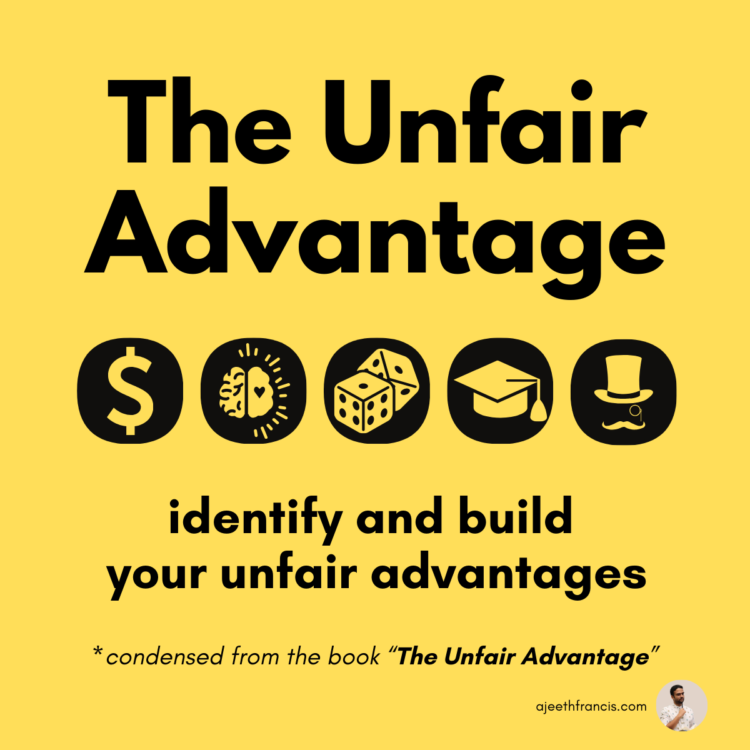
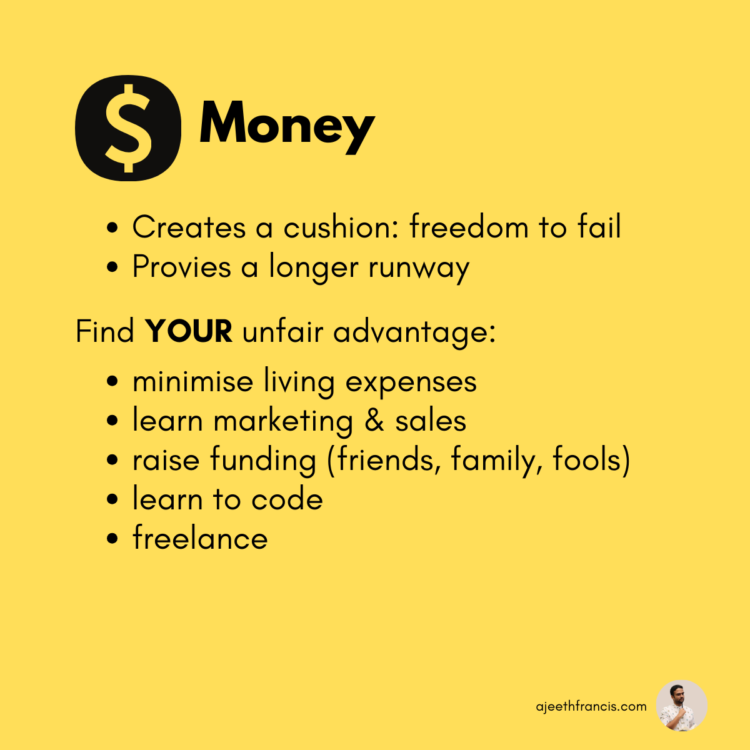
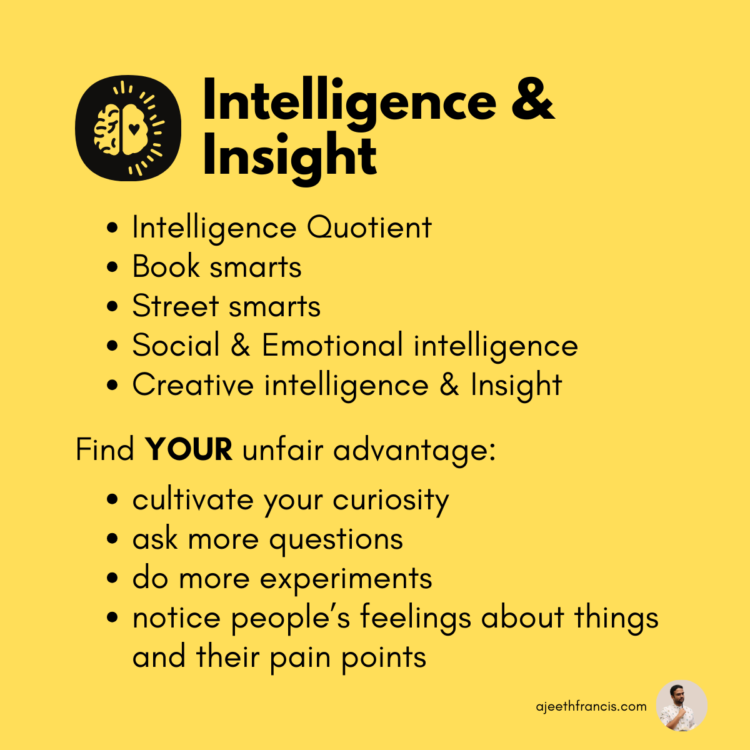
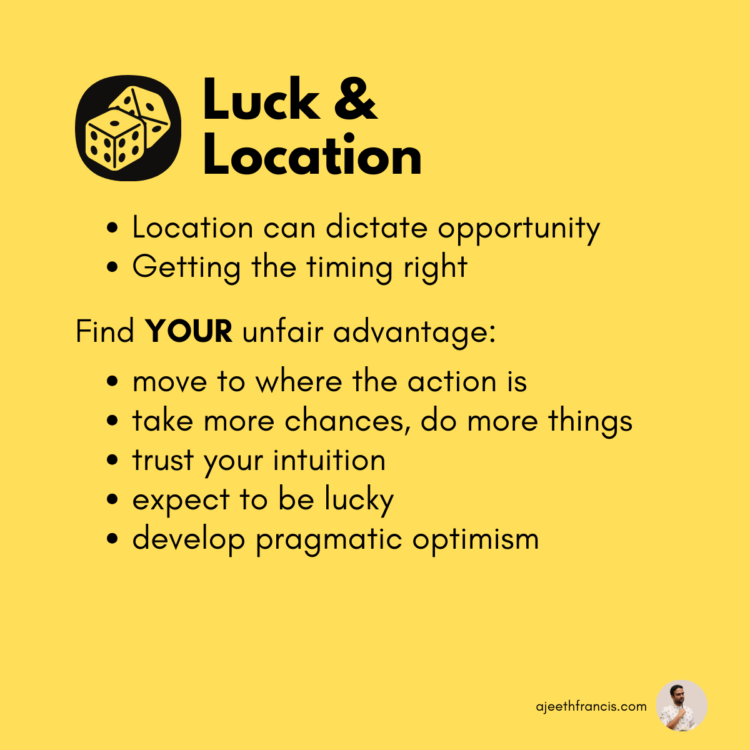
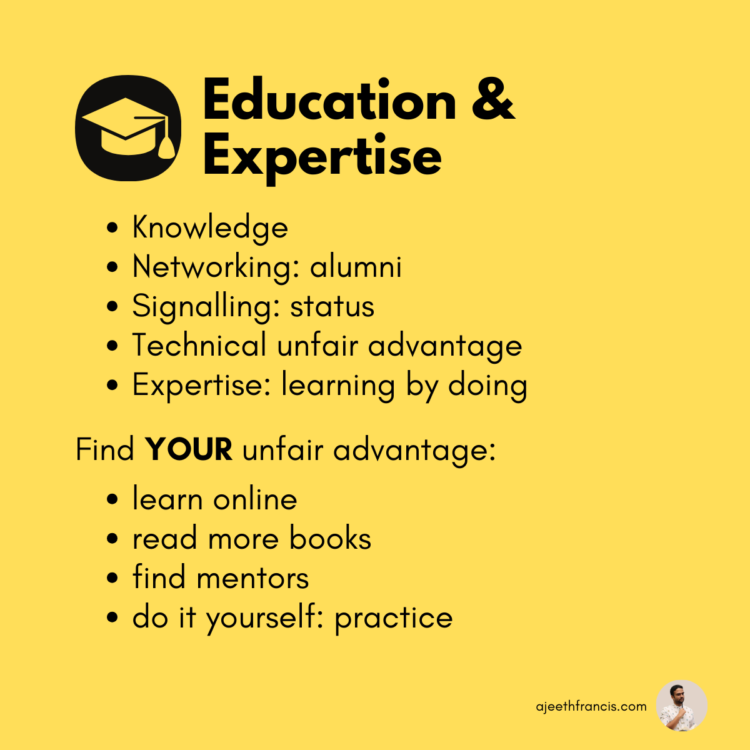
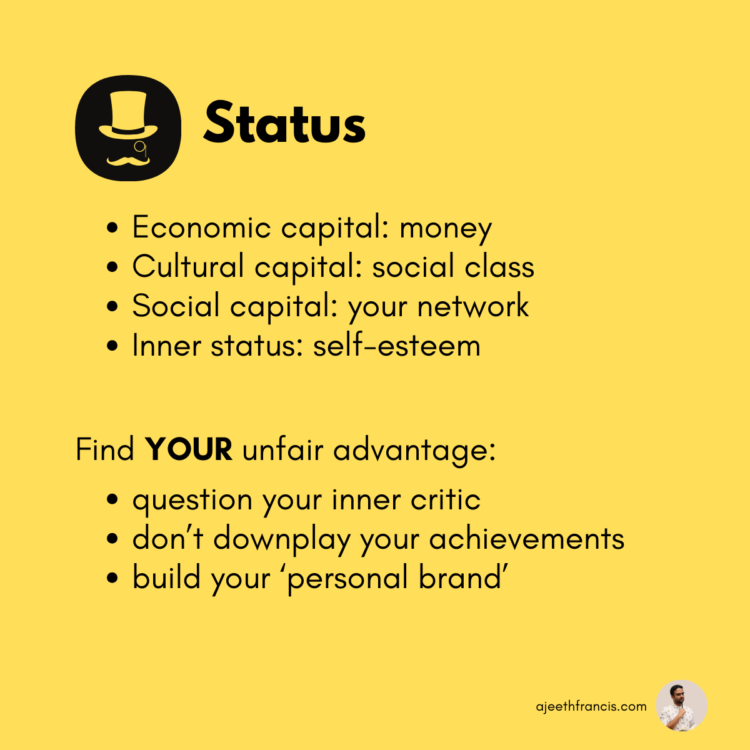
Leave a Reply